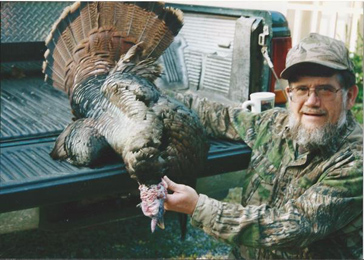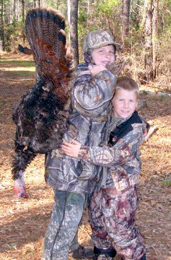Passing The Torch

Dr. Tom Cloer with a huge mountain bird.
By Dr. Thomas Cloer, Jr., Special to The Courier
Editor’s Note: This is the first half of a two-part reflection on five generations of turkey hunting by Courier contributor Dr. Thomas Cloer Jr.
My grandson, Dylan Cloer, came running toward me at our turkey hunting camp, shouting, “Grandpa! Grandpa! I got him; I got a gobbler!”
“Fantastic, Dylan! The torch has been passed!”
I can remember when my son — and Dylan’s dad — Tom Cloer III did it as well. He had heard the old gobbler in the Jocassee Gorges and had hidden on a steep bluff overlooking the river. He bagged that turkey with the same Model 12 Winchester that both my dad and I used to bag our first wild turkeys. The torch passes.
I can remember my first successful turkey hunt with my dad as if it were yesterday. I can remember walking into our mountain hunt camp in the 1950s and seeing the magnificent bird hanging in a blooming dogwood tree. My Dad had called it up close and bagged it in the middle of the day with an old friction caller that required both hands. He had laid his old Model 12 Winchester pump shotgun against a tree. The old gobbler suddenly appeared within a few feet of Dad on a high knoll. When Dad grabbed his shotgun, instead of running to take flight, the big tom unwisely fell behind a log and hid, thus giving Dad time to get ready. Dad was truly a marvelous shot at a moving target, and when that old tom emerged in full stride running to take flight, he didn’t have a chance.
The gobbler from the Penitentiary Cove (no way out except the way you came in) had succumbed to seduction from Dad’s old friction slate caller as he gave the yelps and clucks of a lovesick hen. The caller was one my Grandpa William Thad Cloer had made in his wood-working shop. As a child, I spent much time near that old woodshop. My Grandpa Thad absolutely adored his grandchildren. Grandpa loved for me to hang around and be his sound technician. Grandpa would make his turkey calls out of different woods, such as cedar, walnut and poplar. He would make different sizes of callers and strikers. Sometimes he would use slate strikers. At other times he would use solid wood strikers. He would try anything, such as different saw files, to see what sound each would make as a striker. I felt grown-up when he would ask me to judge them as he tried each caller and then tell him which sounded best.
It was one of my Grandpa Cloer’s old callers that Dad had used to lure the big trophy hung in the blooming dogwood. To this day, I still use that same old caller with its slate striker that I used to seduce the first turkey I ever bagged, 129 turkeys ago (I’ve now hunted in seven different decades).
I was on a high knoll and called very loudly. I wasn’t even sure it was a gobble I had heard. I decided to just wait until I knew for sure. When the old bird gobbled next, he sounded as if he had cut the distance in half. I quickly started looking for a place to hide. Luckily, there was a tree with vines at the base. I quickly and as quietly as possible cleared enough vines to swing the old Model 12 Winchester, the same gun that Dad had used, with No. 4 shot. When the turkey gobbled at 150 yards, I cackled. When he gobbled at 75 yards, I purred and clucked with the hand-me-down caller. If I had not shot the old high-testosterone bird, he would have run over me.
The old call I use today of Dad’s is the same caller that my Grandpa Thad used, and the same type Grandpa made and gave his brother, Charlie. I spent much time with Uncle Charlie. He and I spent hours talking mountain turkey hunting. He never hunted outside the high mountains. The Jocassee Gorges produced a roaring sound also as Dad, Uncle Charlie and Grandpa Thad chased coons with their bawling hounds. Charlie’s coon hound, Rose, and Dad’s treeing walker hound, Rowdy, turned the Jocassee Gorges into a natural opera house.
Uncle Charlie bagged a gobbler in the Jocassee Gorges with Dad when Dad was a teenager in 1934. Grandpa Thad, Uncle Charlie and Dad were walking back to their very primitive camp. An old gobbler that had decided to hide behind a stump by the trail suddenly broke to run and take flight. Dad broke a wing, but the gobbler was still running when Uncle Charlie ended the chapter with his old double-barrel shotgun. Since there was a depression in America, these hungry mountain men immediately cleaned, cooked, and ate the big bird.
We all have something in common — Charlie, my Grandpa Thad, Dad, myself, my son, Tom Cloer III, and my grandson Dylan. We all have shared skills, knowledge, the great excitement, camaraderie, successes, and disappointments associated with turkey hunting with another generation. It really is wonderful to be able to share the excitement through the years in a place like the mountains of the Jocassee Gorges. The old gorges stay wild and continue as another generation of Cloers pass. The next generation utilizes the tool box of mountain turkey hunting to continue in the manner to which their elders had grown accustomed.
Grandpa Thad passed in 1960, Charlie died in 1986 and Dad left in 1995. In the generational scheme of things, my number is up next. The old gorges remain wild and continue to thrive. Grandpa, Uncle Charlie and Dad are gone. My dad’s passing of the torch to me also left me with many memories.
Talk of a Closing Season
“You’ll have to fix up my blind, Tom. I won’t have a chance to do a thing,” Dad complained from his hospital bed the second week in April, and the second week missed of turkey hunting.
“Tom, he won’t need a blind,” Mom replied, with concern and determination arising from sleepless nights on a chair near Dad’s bed. “He just had a diseased kidney removed, and almost died in the process. He can’t go turkey hunting; the doctor said so.”
Dad looked at me with a spark of the old enthusiasm and luminosity that I had come to know and understand after 45 years as a serious hunting companion.
“Tom, don’t listen to that bull; it might be my last spring, my last opportunity,” Dad told me, twisting and grasping a pillow to his chest to help absorb the effects of a cough. “She’s just worried that I’ll overdo it. I want to go turkey hunting just as soon as I can get out of this place.”
Just then the doctor walked in. He was a tall, hefty man who Mom saw as more likely to persuade Dad that turkey hunting this April was not to be considered.
“He’s talking about going turkey hunting!” Mom told the doctor, with an obvious desire for backup firepower.
The doctor chuckled, “You’ve had a most serious type of surgery, Mr. Cloer. I’m afraid you’ll need to give turkey hunting a rest this season.”
Dad looked in my direction stealthily, and with a facial expression I recognized. He basically negated everything he knew I was hearing with that look.
“It’ll be several weeks before you’ll be back to your old self,” the doctor said as he patted Dad’s leg, which was now on top of the bed cover.
I looked closely at that leg that had atrophied somewhat after weeks of serious illness. The calf, however, was still twice the size of an average man, although Dad was a small man. I felt quite proud of the fact that Dad, although 78 years old, had the leg muscles of a weight lifter, and had waded miles of the roughest rivers while trout fishing with me the season before.
The doctor listened to Dad’s heart, and pushed around on his stomach and side. Dad grunted and groaned and the doctor pushed and listened.
“You take it easy. You’re doing well, really well,” he said as he started to open the door to leave.
“When can I go home?” Dad queried.
“Let’s not rush it,” the doctor said. “We’ll take it one day at a time.”
Preparation for
Generational Transfer
I felt very much alone as I walked past the old natural log blinds Dad and I had made in our turkey hunting territory. The dogwoods looked as if a wet snow had fallen on them. The huge white petals glistened with tiny, delicate new green leaves emerging among the blossoms. I stopped to soak up the beauty I saw. A blood-red woodbine vine had encircled one of the dogwoods. Overhanging the dogwood was a canopy of the most fragrant purple wisteria vine I had ever breathed. The air was saturated with the smells of a vibrant spring morning.
Just as I approached the old log blind I was going to rebuild for Dad, a gobble exploded about 200 yards behind a ridge just across the creek that ran through the hollow. I grinned from ear to ear. A pileated woodpecker boomed his reply on a hollow black gum tree. This caused the old gobbler to detonate again. Rays of sunlight penetrated through the forest canopy as morning became more evident. The season was open, and I was tempted to respond with the old call Grandpa had made. But I had purposely left my gun and my caller in the truck to avoid the very temptation I was now facing.
As quietly as I could, I cut some cedar limbs and started sticking them around the old logs that had served as Dad’s blind for 16 years. A family of Carolina wrens quarreled incessantly at me for forcing them out of the fallen logs that I had added to by placing two huge, rotting oak limbs strategically in place. These would serve to hide Dad and give him a soft rest for his old 12 gauge.
As I walked back to the truck, I listened for the old gobbler again. I stood silently near a bed of wild iris fully in bloom and listened earnestly. A gang of crows fussing at a hawk were coming closer to my position. Just then the old gobbler rattled again. He sounded as if he was directly in Dad’s blind. Had he heard my rustling in the leaves, and thought me to be a feeding hen?
As I drove back to the hospital, I seriously pondered whether or not Dad would hunt again, and whether we indeed were hearing the sounds of Dad’s closing season. I daydreamed about the scores of turkeys we had called in many different states. Dad and I started our turkey hunting in the mountains of northern Georgia in the ’50s. We had hunted on Wayah Bald in Western North Carolina, on the peninsula in Eastern Tennessee, and in the wild and beautiful Jocassee Gorges of South Carolina. We had slept in the woods, waded the rivers in the darkness before daylight, endured the mosquitoes, braved the storms, and we had done it all together. I couldn’t imagine how it would be without him. I pushed that thought aside. However, that gripping fear would return to me.
Dr. Thomas Cloer Jr. is Professor Emeritus, Furman University. Furman offers an endowed scholarship annually, with Dr. Cloer’s name attached, to a promising student in the Department of Philosophy. The scholarship is endowed by a grateful Texas family “in appreciation for the guidance and concern demonstrated by Dr. Cloer.”



























